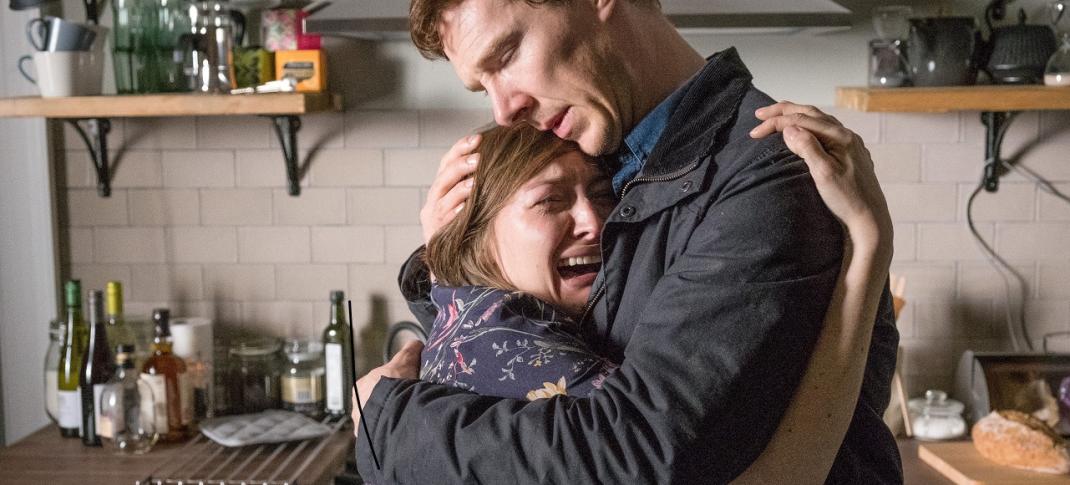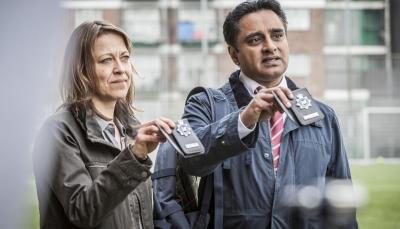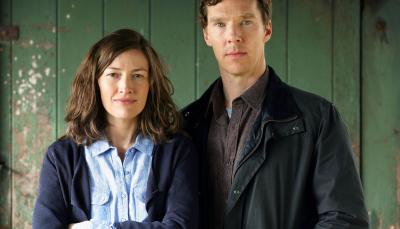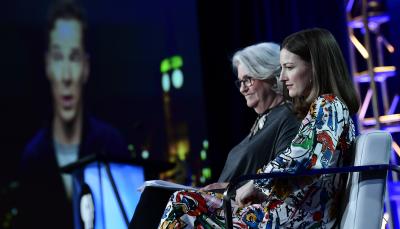'The Child in Time' Recap

The Child In Time MASTERPIECE on PBS Sunday, April 1 at 9pm ET In an adaptation of Ian McEwan’s award-winning 1987 novel by the same name, Benedict Cumberbatch and Kelly Macdonald star as the grieving parents of a missing little girl. Set two years after the girl’s disappearance, the film explores the dark territory of a marriage devastated, the loss of childhood, the fluidity of time, grief, hope and acceptance. Shown from left to right: Kelly Macdonald as Julie Lewis and Benedict Cumberbatch as Stephen Lewis For editorial use only. No third party rights granted. Courtesy of Pinewood Television, SunnyMarch TV and MASTERPIECE for BBC One and MASTERPIECE
WARNING: Use of this copyright image is subject to the terms of use of BBC Pictures' Digital Picture Service (BBC Pictures) as s
The Child in Time is one of those dramas that doesn’t turn out to be quite the story you think it is. On the surface, it’s a tale about a lost child. But, it also isn’t, in the most basic sense. The drama isn’t about the search for the missing Kate and it (spoiler alert!) offers little resolution about what happened to her. Her parents (spoiler alert, again!) don’t get her back. There’s no happy ending. She remains forever apart, both present and absent, a Schroedinger’s cat of a girl who is somehow both alive and dead for the purposes of this narrative. If you were looking for a crime thriller, a dramatic mystery or even a linear story that makes sense, you’re surely bound to be disappointed here.
Instead, The Child in Time is a meditation on loss and grief, telling the story of what it takes to move past the worst thing that’s ever happened to you. In short: It’s kind of a lot for an evening on Easter Sunday, though those that stick through it may find the performances contained within worthwhile. (Or, at least, I did.) The acting is top notch and the emotions feel gut-wrenchingly real. However, if you find yourself wishing the story perhaps spent a bit more time on Kate herself or the particulars behind her disappearance rather than the gamut of British political thought about child rearing or a weirdo subplot about a grown man’s descent into what appears to be childlike madness, trust me, you’re not alone.
The story of The Child in Time opens with a terrible loss, and it closes with the idea that survival – even renewal – is possible. Along the way, however, you’re likely to feel rather confused, as the narrative ricochets back and forth through time and keeps veering off to focus on a set of bizarre secondary characters or debate the meaning of childhood. In the end, the story probably would have been better served not only by a more linear narrative, but a clearer focus. Whenever The Child in Time centers on Stephen, his wife Julie or their relationship in the wake of their daughter’s disappearance, it’s riveting, gut-wrenching stuff. It’s just that there’s so much of everything else, and that all tends to gravitate toward the confusing or dull. It’s a mixed bag, this story, and I’m probably not the only one who doesn’t quite know how to feel about it. (To be honest: I want to like it. I just…don’t think that I do.)

The series opens with its most gripping segment, as Stephen Lewis, a children’s author and devoted father, loses track of his daughter while shopping in a local supermarket. It’s every parent’s worst nightmare and Benedict Cumberbatch conveys the anguish and panic of the moment with what feels like horrifying accuracy. Within the first ten minutes of the story, we must watch Stephen realize his child is missing, frantically beg a surrounding crowd for the slightest hint of a girl in a yellow coat, and then resolutely break the news to his wife (the generally phenomenal Kelly Macdonald) that their daughter is gone. Not just that she's gone, but that he has, in the strictest sense, lost her.
The Child in Time is at its most effective when it focuses on the story’s grieving parents. It conveys the despair, rage and guilt each feels effortlessly and manages to show us the ultimate dissolution of their relationship without having to explain each step. Of course Stephen feels guilty and responsible. And you can really fault Julie for blaming her husband for Kate’s disappearance – after all, he left the house with her, and came back without her. None of these emotions are necessarily correct or fair, but they feel reasonable and understandable. As the story unspools and three years pass, it even makes a certain amount of sense that the two would be drawn back together, as the problems in their marriage never seemed to have much to do with their feelings for one another. As Stephen and Julie tentatively rekindle their relationship – he visits her oceanside cottage, she begins teaching him to play piano – it’s hard not to root for the two of them to work things out, since we’re (nearly simultaneously) watching them lose everything.
However, The Child in Time doesn’t spend as much time as it probably should on Stephen and Julie’s relationship in the years following Kate’s disappearance. Instead, the story expands to include a political angle that pretty much zero people asked for. Somehow, Stephen’s role as a celebrated children’s author has earned him a spot on some kind of government committee related to childcare. Why this should be so is an utter mystery as, besides writing books aimed at children and at one point having had a child himself, Stephen appears to have little in the way of professional qualifications on this issue. All I can say is I hope that J.K. Rowling is on some sort of government board somewhere if all it takes to influence child policy in England is literary success.

The Child in Time’s other major subplot involves Stephen’s best friend Charles Darke. A junior government minister who’s just written some kind of – presumably horrible – parody novel, Charles is nevertheless somehow important enough that the Prime Minister himself is concerned when he starts having what appears to be a massive mental breakdown. (The PM even asks Stephen himself to see to Charles and his condition, because I guess the head of the British government doesn’t have access to, oh, mental health professionals, or anything like that.)
At any rate, Charles appears to be suffering from some kind of delusion which causes him to see himself as a child again – or at least behave as one. We’re treated to multiple scenes of Charles hiding out in his adult tree fort, wearing ragged clothes and drinking what appears to be his own urine out of bottles he keeps handy. And for some reason his wife just…supports all of this! I know that my reaction probably shouldn’t have been to laugh when Thelma when outside to call her husband inside at the end of the day by flicking the back porch light on an off, but I couldn’t help myself. I have no idea what I’m supposed to take away from this part of the story at all.
I’m told that the novel The Child in Time is based on uses these characters as sort of a basis to explore larger fantastical issues like the fluidity of time itself or something like that, but man, this show does not do that at all. Maybe I’m supposed to extrapolate that Charles’ regression into childhood is some kind of metaphor for the struggle within all of us against the suffocating blanket of adulthood, but why? Why is the point not that this man needs some therapy and a strong dose of Prozac? What is this story even trying to say? (I’m serious, someone explain all this to me in the comments. Because I feel lost.)

In the midst of all this, Stephen is still seeing visions of his daughter everywhere, and at one point even goes so far as to follow a little girl into a school, convinced she’s his missing child. It’s only after an incredibly awkward conversation with the school faculty that he realizes she isn’t, and breaks down crying. Cumberbatch, it must be said, is a horrendously ugly crier, but I appreciate that he just leans into the raw emotion, complete with snot and full body sobs. By the time we get to the point where Stephen is sending his daughter messages using a walkie talkie set from a Christmas gift pile she wasn’t around to see, we’re all sniffling too.
Despite these powerful individual moments, which really play up the pain and yearning of a parent who has lost everything, the ending of The Child in Time isn’t entirely satisfying. As previously mentioned, we never find out what happened to Kate, and neither do her parents. Instead, they just go on, in both a literal and figurative fashion. Because Julie, as it turns out, is pregnant.
To be honest, this story – Julie’s pregnancy and her decision to have another child with Stephen in the first place – would have been roughly 100 times more interesting than watching multiple scenes of Charles playing imaginary cops and robbers and eventually hanging himself (why??) in the woods, but alas, here’s where the story ends, with the knowledge that it simply goes on. Life goes on. The Lewises have a son together, Julie refers to Stephen openly as her husband to the nurses – implying, I assume, that their relationship will also get something of a fresh start as well. But, nothing’s confirmed and it’s all a bit choose your own adventure in the end. Which isn’t a bad metaphor for life, all things considered, but personally I’d prefer my dramas to make a little more sense.
What did you think of The Child in Time? Let’s discuss.




